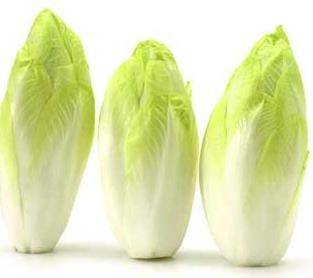Endive - Escarole
Searcy, Ark. –
Endive and escarole are common in the Mediterranean and Greek islands. They are hardy annual vegetables that have the same growing requirements. The primary difference between them is that endive has curled, finely cut leaves, while escarole has broad, flat leaves. They are cool-season plants that grow well in the spring and better in the fall. Although endive is produced in Florida, it is produced as a winter vegetable. Endive and escarole are delicacies when blanched and used for salads or as a garnish. In Arkansas we recommend the following cultivars, Full Heart Batavian, Green Curled, Salad King, Broad Leaved Batavian, Indigo, or Red Treviso.
Planting Time
Endive and escarole do not thrive under hot conditions. They must be grown as an early or fall crop. They in much the same manner as lettuce, responding well to fertile soil, mean growing temperatures between 60 and 70 degrees F and a uniform supply of moisture.
Spacing and Depth of Planting
Plants may be started inside in late February and transplanted into the garden in early April. Plant seed 1/4 inch deep in a container of sterile soil mix. When the seedlings are less than 1 inch high, they may be spaced 1 1/2 to 2 inches apart in a flat. The seedlings are ready to plant in the garden when they are 2 1/2 to 3 inches high. Use a starter fertilizer solution to establish a fast start and a mature plant before summer heat.
Seed may be planted directly in the garden in mid-March to early April. Plant seed 1/4 inch deep in rows 18 to 24 inches apart. When the seedlings are 1 inch high, they should be thinned or transplanted to 9 to 12 inches apart. Water frequently during the hot summer months. Endive is very hardy and will withstand frost to give harvest through early winter.
Care
Unless blanched, the spreading plants are likely to be bitter. When sunlight is kept from the center leaves, their green color is reduced, bitterness is decreased and texture and flavor are improved. Heads are usually blanched after the leaves spread sufficiently to touch the next plant. Tie the tops of outermost leaves together as the head develops. Make sure the plants are dry before tying the leaves. If the plant is not dry, the inner leaves may rot. Blanching requires two to three weeks, and several plants may be blanched at one time.
Harvesting
After the blanched heads have developed, cut the plants at ground level. If the weather turns very hot in the summer or a hard freeze is expected in the winter, cut the heads, wash, drip dry and store in a polyethylene bag in the refrigerator for later use. Discard the tough outer leaves.
###
By Sherri Sanders
County Extension Agent - Agriculture
The Cooperative Extension Service
U of A System Division of Agriculture
Media Contact: Sherri Sanders
County Extension Agent - Agriculture
U of A Division of Agriculture
Cooperative Extension Service
411 No Spruce Searcy AR 72143
(501) 268-5394
ssanders@uada.edu
Related Links
The Arkansas Cooperative Extension Service is an equal opportunity/equal access/affirmative
action institution. If you require a reasonable accommodation to participate or need
materials in another format, please contact your County Extension office (or other
appropriate office) as soon as possible. Dial 711 for Arkansas Relay.
The Arkansas Cooperative Extension Service offers its programs to all eligible persons
regardless of race, color, sex, gender identity, sexual orientation, national origin,
religion, age, disability, marital or veteran status, genetic information, or any
other legally protected status, and is an Affirmative Action/Equal Opportunity Employer.
